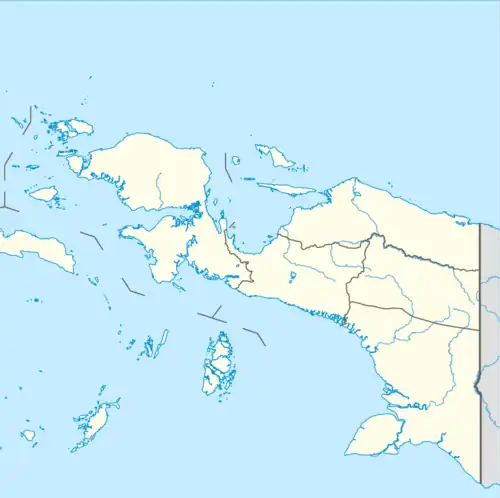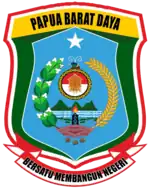Sorong | |
|---|---|
| City of Sorong Kota Sorong | |
 | |
 Coat of arms | |
| Motto(s): Setara – Bersahabat – Dinamis (Equal – Friendly – Dynamic) | |
 Location in Southwest Papua | |
OpenStreetMap | |
 Sorong Location in Western New Guinea and Indonesia  Sorong Sorong (Indonesia) | |
| Coordinates: 0°52′S 131°15′E / 0.867°S 131.250°E | |
| Country | |
| Region | Papua |
| Province | Southwest Papua |
| Government | |
| • Mayor | Lambert Jitmau |
| • Vice Mayor | Pahimah Iskandar |
| Area | |
| • Total | 1,105.0 km2 (426.6 sq mi) |
| Population (mid 2022 estimate) | |
| • Total | 295,809 |
| • Density | 270/km2 (690/sq mi) |
| [1] | |
| Time zone | UTC+9 (Indonesia Eastern Time) |
| Postcodes | 98414 |
| Area code | (+62) 951 |
| Website | sorongkota |

Sorong is the largest city and the capital of the Indonesian province of Southwest Papua. The city is located on the western tip of the island of New Guinea with its only land borders being with Sorong Regency. It is the gateway to Indonesia's Raja Ampat Islands, species rich coral reef islands in an area considered the heart of the world's coral reef biodiversity.[2] It also is the logistics hub for Indonesia's thriving eastern oil and gas frontier. Sorong has experienced exponential growth since 2010, and further growth is anticipated as Sorong becomes linked by road to other frontier towns in Papua's Bird's Head Peninsula.
Etymology
The origin of Sorong's name comes from the word Soren, which means "deep and wavy ocean" in the Biak language. The name was first used by the Biak-Numfor people who sailed to different islands before they finally decided to settle down in Raja Ampat Islands. When the Biak-Numfor people came to the place called "Daratan Maladum", they decided to call it Soren. After centuries of contact with Chinese merchants, European missionaries, and people from Maluku and Sangihe-Talaud, the name underwent further change into Sorong.[3]
History
Dutch influence over the region was minimal until the 20th century, when a colonial post was established on Doom Island in 1906, serving as the Dutch administrative center of the region.[4] In the 1930s, the Dutch oil company Nederlandsch Nieuw Guinee Petroleum Maatschappij (NNGPM) had discovered oil off the coast of Sorong.[5] The newly established oil fields led to the expansion of Dutch colonial influence in Western New Guinea, and had made Sorong into a valuable military target. During World War II, Sorong was occupied by the Empire of Japan in 1942, and would serve as the center of operations for Japanese forces during the Western New Guinea campaign. The Battle of Sansapor in June 1944 would effectively end Japanese control over the Bird's Head Peninsula, and by August 1944 any remaining Japanese presence in the region was removed by the US 6th Division.[6] After the Indonesian War of Independence, the colonial administration would attempt to expand oil production with the construction of the 58 kilometer Klamono-Sorong pipeline.[7] However, oil production declined after the war, and by 1961 oil production had dropped another 33%. This decline in production contributed to the demise of the Dutch colonial administration, as the Dutch administration over the territory could no longer be defended as economically viable. Under Indonesian administration, oil production would return to pre-war levels, and by 1967 production had more than trebled from 1961 levels.[7] Today, the city still remains as one of the major oil and gas producers of Indonesian New Guinea.
In 1972, Sorong was reformed into an autonomous city, and then reformed into an administrative city in 1996.[8] Administrative cities were abolished in 1999, granting Sorong full city status, and separating Sorong City from the Sorong Regency.[9]
Administrative districts
At the 2010 Census, the city comprised six districts (distrik), but the number has subsequently been increased to ten by the splitting of existing districts. These are tabulated below with their populations at the 2010 Census[10] and 2020 Census,[11] together with the official estimates for mid-2022.[1] The table also includes the locations of the district administrative centres, the number of administrative villages (all classed as urban kelurahan, 41 in total) in each district, and its post code.
| Kode Kemendagri | Name of District (distrik) | Area in km2 | Pop'n 2010 Census | Pop'n 2020 Census | Pop'n mid 2022 Estimate | Admin centre | No. of villages | Post code |
|---|---|---|---|---|---|---|---|---|
| 92.71.03 | Sorong Barat (West Sorong) | 127.74 | 35,306 | 38,578 | 39,892 | Klawasi | 4 | 98412 |
| 92.71.10 | Maladum Mes (a) | 126.40 | (b) | 11,412 | 13,461 | Tanjung Kasuari | 4 | 98411 |
| 92.71.04 | Sorong Kepulauan (c) (Sorong Islands) | 200.11 | 9,711 | 11,801 | 11,628 | Doom Timur | 4 | 98413 |
| 92.71.02 | Sorong Timur (East Sorong) | 69.39 | 26,804 | 40,374 | 43,482 | Klamana | 4 | 98418 |
| 02.71.05 | Sorong Utara (North Sorong) | 127.21 | 45,001 | 37,029 | 39,066 | Malanu | 4 | 98410 |
| 92.71.01 | Sorong (distrik) | 48.81 | 31,264 | 19,083 | 19,547 | Remu | 4 | 98416 |
| 92.71.06 | Sorong Manoi | 135.97 | 42,539 | 55,482 | 56,593 | Malawei | 5 | 98415 |
| 92.71.08 | Klaurung | 88.83 | (b) | 15,145 | 16,400 | Klablim | 4 | 98417 |
| 92.71.09 | Malaimsimsa | 102.50 | (b) | 32,600 | 33,391 | Klabulu | 4 | 98419 |
| 92.71.07 | Sorong Kota (Sorong town) | 78.04 | (b) | 21,446 | 22,176 | Kampung Baru | 4 | 98414 |
| Totals | 1,105.00 | 190,625 | 284,410 | 295,809 | 41 |
Note: (a) A coastal strip along the northern edge of the city. (b) the populations as at 2010 of the four new districts established after 2010 are included in the figures for the districts from which they were split off.
(c) Sorong Kepulauan District comprises 25 islands off the west coast of Sorong but within the city limits, including Doom, Soop, Raam and Umbre Islands.
Demographics
The city had a population of 190,625 at the 2010 Census[10] and 284,410 at the 2020 Census;[11] the official estimate (as at mid 2022) was 295,809 (comprising 155,628 males and 140,181 females). In mid 2022, 47.34% of the city population were Protestant, 44.82% were Muslim, and 7.55% Catholic, with minorities of Buddhists and Hindus.[1]
Climate
Sorong experiences a tropical rainforest climate (Köppen Af), as there is no real dry season throughout the year. The wettest month is June, with a total rainfall of 373 millimetres (14.7 in), while the driest month is February, with a total rainfall of 180 millimetres (7.1 in). The excessive rainfall is caused by the monsoon. The temperature variation remains constant throughout the year. The temperature difference between the hottest month and the coolest month is 1.2 °C (2.2 °F). The hottest month is November, with an average temperature of 27.8 °C (82.0 °F), while the coolest month is July, with an average temperature of 26.6 °C (79.9 °F).
| Climate data for Sorong, West Papua | |||||||||||||
|---|---|---|---|---|---|---|---|---|---|---|---|---|---|
| Month | Jan | Feb | Mar | Apr | May | Jun | Jul | Aug | Sep | Oct | Nov | Dec | Year |
| Mean daily maximum °C (°F) | 30.6 (87.1) |
30.5 (86.9) |
30.5 (86.9) |
30.7 (87.3) |
30.6 (87.1) |
30.0 (86.0) |
29.4 (84.9) |
29.5 (85.1) |
29.9 (85.8) |
30.7 (87.3) |
31.0 (87.8) |
30.8 (87.4) |
30.4 (86.7) |
| Daily mean °C (°F) | 27.5 (81.5) |
27.4 (81.3) |
27.5 (81.5) |
27.6 (81.7) |
27.5 (81.5) |
27.1 (80.8) |
26.6 (79.9) |
26.7 (80.1) |
26.9 (80.4) |
27.5 (81.5) |
27.8 (82.0) |
27.6 (81.7) |
27.3 (81.1) |
| Mean daily minimum °C (°F) | 24.4 (75.9) |
24.4 (75.9) |
24.6 (76.3) |
24.5 (76.1) |
24.5 (76.1) |
24.3 (75.7) |
23.9 (75.0) |
23.9 (75.0) |
24.0 (75.2) |
24.3 (75.7) |
24.6 (76.3) |
24.5 (76.1) |
24.3 (75.7) |
| Average rainfall mm (inches) | 194 (7.6) |
180 (7.1) |
198 (7.8) |
243 (9.6) |
368 (14.5) |
373 (14.7) |
321 (12.6) |
277 (10.9) |
234 (9.2) |
207 (8.1) |
186 (7.3) |
188 (7.4) |
2,969 (116.8) |
| Average relative humidity (%) | 81 | 81 | 82 | 82 | 85 | 84 | 85 | 86 | 85 | 82 | 82 | 83 | 83 |
| Source 1: Climate-Data.org (average temps & precipitation)[12] | |||||||||||||
| Source 2: Weatherbase (humidity)[13] | |||||||||||||
Economy
A container port was built in Sorong with an annual container-handling capacity of 500,000 twenty-foot equivalent units (TEUs) at a cost of Rp.800 billion (US$93.6 million). Construction began in early 2012 and was intended to be completed in mid-2013,[14] but was delayed and was inaugurated on 20 September 2021.
The state-owned oil company Pertamina operates a dockyard in Sorong.[15] The city is served by Domine Eduard Osok Airport.[16]
In popular culture
The phrase "Sorong to Samarai" is commonly used throughout Papua New Guinea and Indonesian Papua to express solidarity and oneness and makes reference to both Sorong, a town in Southwest Papua, Indonesia and Samarai, a small township being one of the easternmost point located in Milne Bay Province, Papua New Guinea. It is sometimes used by Papuan independence activists in reference to Papuan unification, in opposition to the common Indonesian phrase of "Sabang to Merauke". In 2016, the ARIA Music Awards-nominated Papua New Guinean-Australian musician Airileke released a single titled "Sorong Samarai".[17]
Cooperation and friendship
In addition to its sister cities, Sorong cooperates with:
References
- 1 2 3 Badan Pusat Statistik, Jakarta, 2023, Kota Sorong Dalam Angka 2023 (Katalog-BPS 1102001.9271)
- ↑ "Raja Ampat, Indonesia".
- ↑ "Etymology of Sorong".
- ↑ Indonesia Reports. Indonesia Publications. 1986. p. 49. Retrieved 15 August 2023.
- ↑ McGibbon, Rodd (2004). "Plural Society in Peril: Migration, Economic Change, and the Papua Conflict". East-West Center: 8. Retrieved 16 August 2023.
- ↑ Morison, Samuel Eliot (2001). History of United States Naval Operations in World War II: New Guinea and the Marianas, March 1944 – August 1944. University of Illinois Press. pp. 140–144. ISBN 0-252-07038-0. Retrieved 16 August 2023.
- 1 2 Poulgrain, Greg (September 1999). "Delaying the 'Discovery' of Oil in West New Guinea". The Journal of Pacific History. 34 (2): 215–216. Retrieved 16 August 2023.
- ↑ "History of Sorong City". West Papua Daily News Update. 29 September 2021. Retrieved 16 August 2023.
- ↑ "Undang-undang Nomor 45 tahun 1999 tentang Pembentukan Daerah Propinsi Irian Jaya Tengah, Daerah Propinsi Irian Jaya Barat, Daerah Kabupaten Paniai, Daerah Kabupaten Mimika, Daerah Kabupaten Puncak Jaya, Dan Daerah Kabupaten Puncak Jaya Dan Daerah Kota Sorong". Law No. 45 of 1999 (in Indonesian).
- 1 2 Biro Pusat Statistik, Jakarta, 2011.
- 1 2 Badan Pusat Statistik, Jakarta, 2021.
- ↑ "Climate: Sorong". Climate-Data.org. Retrieved 1 June 2016.
- ↑ "SORONG, INDONESIA". Weatherbase. Retrieved 1 June 2016.
- ↑ Post, The Jakarta. "Container port to be built in Sorong".
- ↑ "Dewan Komisaris Pertamina Kunjungi Dockyard Sorong". Berita Satu (in Indonesian). 27 October 2021. Retrieved 3 January 2024.
- ↑ ".:: Directorate General Of Civil Aviation - Ministry Of Transportation Republic Of Indonesia ::". 3 February 2014. Archived from the original on 3 February 2014.
- ↑ "Sorong Samarai - Expressing unity, calling for change".
External links
- Official website
 (in Indonesian)
(in Indonesian)
